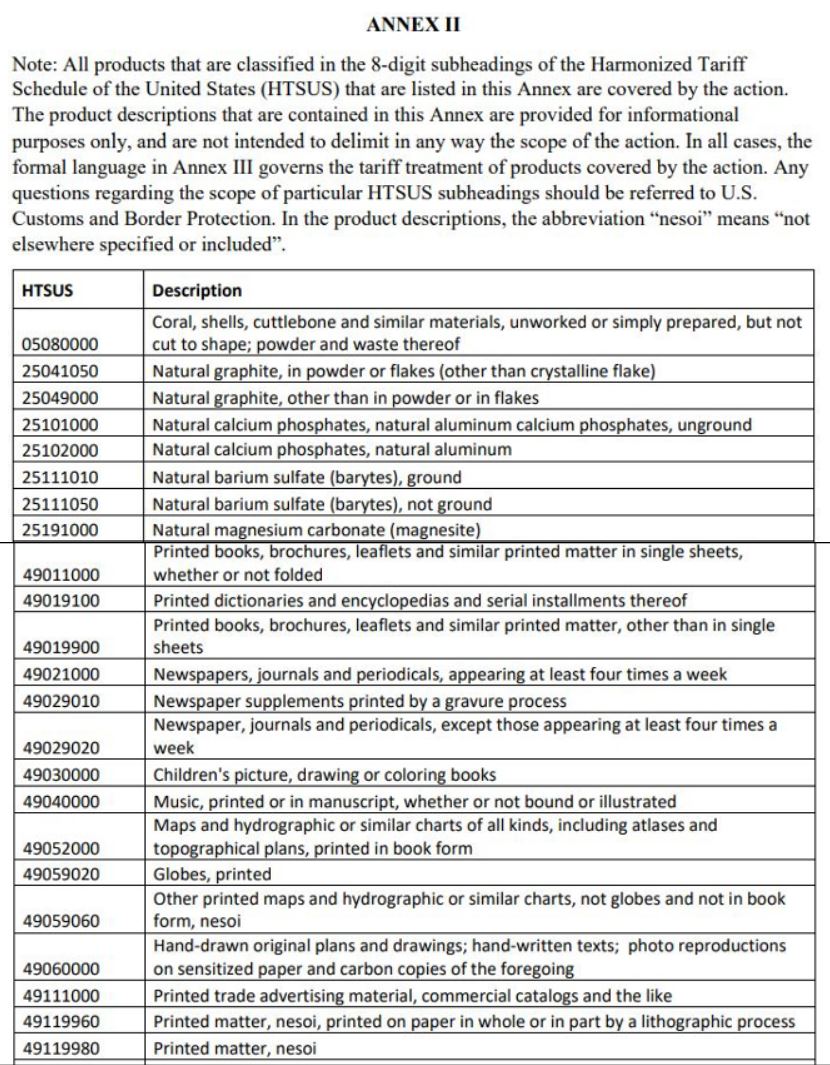Are Books Subject to the New Tariffs?
- by Michael Stillman

Books, like crocidolite, should be exempt from tariffs.
Are books purchased in America, shipped from a foreign country, subject to tariffs? Not long ago, the easy answer was “no.” Now it's “I don't know.” The tariff situation is so confusing and changing day to day that it is hard to know. The President undoubtedly always tells the truth, but he does change his mind a lot. Add to that the incomprehensible legalese that envelopes everything that comes out of Washington and we have a problem. What nations and which goods are subject to tariffs?
There is something called the Harmonized Tariff Schedule which lists various goods. Then there is something else called Annex II which lists exemptions from tariffs. Section 49011900 of these exemptions lists “Printed books, brochures, leaflets and similar printed matter, other than in single sheets.” Other sections contain related items, like books, etc., printed in single sheets, children's picture or coloring books, music printed or in manuscript, maps and atlases, globes, hand-drawn plans, drawings and texts, advertising material and catalogues, etc. Newspapers, and numerous other items are described in a curious way only a government bureaucrat could possibly understand - “newspapers appearing at least four times a week” and “newspapers...except those appearing at least four times a week.” Why can't they just say “newspapers?” Probably because it is not confusing enough to say it that way.
At least the exemption for books is clear, no? No. We received a message from Lawrence Blume inquiring whether we knew more about the rules. He was under the same impression as I, that books, excepting from China and Russia, are exempt from tariffs. Then, he explains, “But I have just completed a long discussion with DHL on shipment of a book from the UK in which they asserted that I owed them USD500, a 10% tariff on a recently purchased book.” This seems inconsistent with the rules, but DHL said books from the UK are subject to a 10% tariff because of the Temporary Legislation; Temporary Modifications Established Pursuant to Trade Legislation; Additional Import Restrictions Established Pursuant to Section 22 of the Agricultural Adjustment Act, As Amended.” Of course, who wouldn't think to look in an agricultural act to check on whether books are subject to tariffs? After all, books, like money, grow on trees.
I attempted to find out how this “temporary legislation” applied to the tariffs that were suspended for 90 days on April 7, suspension extended on July 9 to August 1. I didn't see anything that made me think the exemption for books ended July 9, but I did not find the complete act on the internet, and it can be hard to find out about something if it didn't happen. Besides which, it isn't worth too much time trying to figure it all out when the rules would be changing around August 1. Even that is vague as different tariff treaties are being negotiated for each country. An agreement was reached with the European Union, but even that has not been finalized yet, and I don't know how that will treat books. Meanwhile, negotiations are ongoing with the UK, the source of the shipment in question, which may or may not have been concluded by the time this article is published.
This brings us back to Mr. Blume's question, which I have failed to answer. Did DHL rightfully charge him $500 for the tariff or were they in error? Either they know the law better than the rest of us, they too were confused, or they have decided to play it safe and have their customers pay. We have seen numerous media and other companies change their rules and pay multi-million dollar settlements to keep the government happy, even if the claims were of uncertain validity. America today is playing by a different set of rules than it has in the previous almost 250 years of its existence and there is some fear of retaliation. The good old days of 2024 are over. It's better to be safe than sorry.
If anyone out there knows the answer to this question, before or after August 1, or with regards to England or someplace else, please let us know.